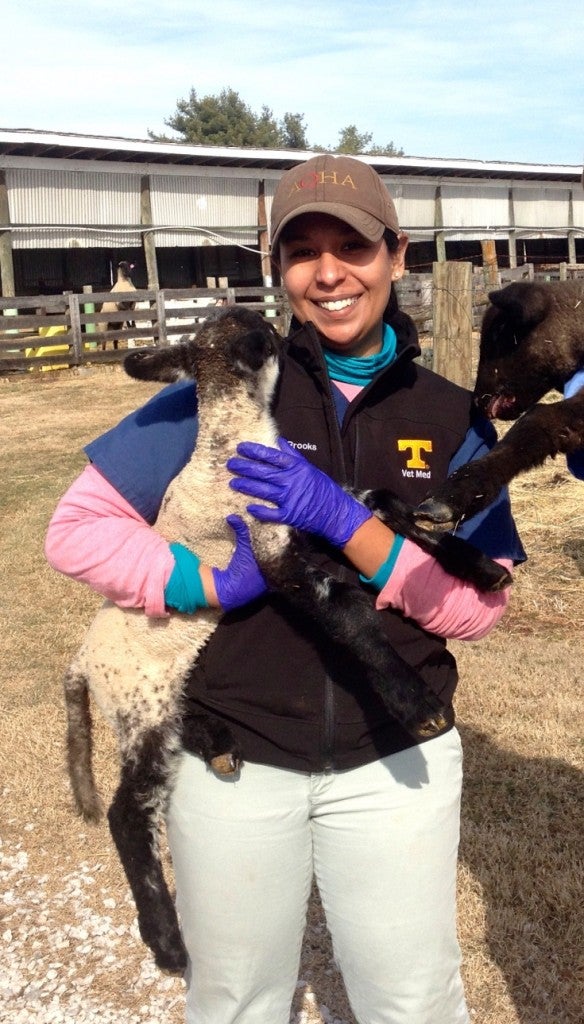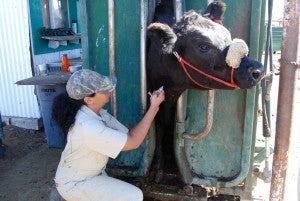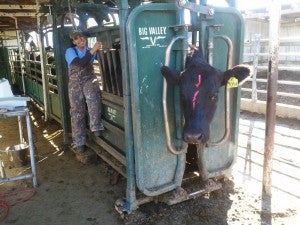 Former VSTP Pfizer Fellow Roxann Brooks Motroni on thinking outside-the-box for career options and appreciating California’s cattle ranchers
Former VSTP Pfizer Fellow Roxann Brooks Motroni on thinking outside-the-box for career options and appreciating California’s cattle ranchers
Roxann Brooks Motroni – a Veterinary Scientist Training Program (VSTP) Pfizer Fellow – holds a PhD in Comparative Pathology (2012) and a DVM (2013) from the UC Davis School of Veterinary Medicine. She was an important part of the team working on developing a vaccine to prevent foothill abortion in cattle under Professor Jeff Stott. She sat down with us by phone recently to share her experiences at the school during a pivotal time for the foothill abortion vaccine and what she is doing now as an AAAS Fellow for the Department of Homeland Security in Washington DC.
Tell me a little about your background. What got you interested in veterinary medicine?Like every other veterinary student, I wanted to be a vet since I was three and never thought of anything else. I’m originally from Virginia. At 16, the state of Virginia offered a ‘Governor’s School of Agriculture’ at Virginia Tech that gave me the opportunity to work in a research lab. Through participating in this program I realized I really liked research. It was my first time thinking outside-the-box about my career choices and I pursued every research experience I could. I ended up with a full scholarship to the University of Maryland, Baltimore County where I studied biology. This was the time when West Nile Virus entered the U.S., and it got me thinking about infectious diseases and the wildlife-livestock interface. For example, how wildlife management protects livestock and how cattle can graze without effecting wildlife.
How long were you at UC Davis? What did you think of California, being a ‘born & bred’ East Coaster? Seven years. The School of Veterinary Medicine was a dream school for me. Amazing. It had both great wildlife programs and infectious disease work. My time there was my West Coast adventure. I married a Californian so I can come back!
 How did you get involved in the development of a vaccine to prevent foothill abortion (FA) in cattle with Professor Jeff Stott? He said you were the only student he ever engaged in FA research as a thesis project. He also says you performed at the highest level, hated to see you go and that your successes since you left have not surprised him. After rotating through Professor Pat Conrad’s lab and a summer away in Switzerland where I worked on avian influenza, I talked with Dr. Stott about joining his lab. He was an amazing mentor. He told me ‘this is your PhD – you have free rein to try what you think will work.’ The work then took off – I helped find genes for the recombinant vaccine and developed a mouse model so we could screen vaccine candidates faster. I helped design and participate in the first live cow field studies that proved efficacy of the vaccine before the USDA field trials were initiated. A friend who ranches in the Central Valley of California also played a big role in my decision to get involved in this disease. She told me what a big deal preventing foothill abortion was to cattle producers in California.
How did you get involved in the development of a vaccine to prevent foothill abortion (FA) in cattle with Professor Jeff Stott? He said you were the only student he ever engaged in FA research as a thesis project. He also says you performed at the highest level, hated to see you go and that your successes since you left have not surprised him. After rotating through Professor Pat Conrad’s lab and a summer away in Switzerland where I worked on avian influenza, I talked with Dr. Stott about joining his lab. He was an amazing mentor. He told me ‘this is your PhD – you have free rein to try what you think will work.’ The work then took off – I helped find genes for the recombinant vaccine and developed a mouse model so we could screen vaccine candidates faster. I helped design and participate in the first live cow field studies that proved efficacy of the vaccine before the USDA field trials were initiated. A friend who ranches in the Central Valley of California also played a big role in my decision to get involved in this disease. She told me what a big deal preventing foothill abortion was to cattle producers in California.
What was your favorite part of working on the FA vaccine? Apart from working with cows every day, it was working with the cattlemen and realizing that the work we were doing was immediately helpful and applicable to them. I really grew to understand and appreciate ranching in California.
What are you doing now? I love livestock. After UC Davis, I did a food animal ambulatory internship at the University of Tennessee working with cattle, sheep and goats. Now I am in the DC area. I have a fellowship with the American Association for the Advancement of Science (AAAS) and am a Science and Technology Policy Executive Branch Fellow with the U.S. Department of Homeland Security, Agriculture Defense Branch. We develop vaccines and fund research and development to help protect from high-consequence animal diseases that are foreign to the U.S. and could cause economic devastation. My main project right now is working on an international field trial to test a novel foot-and-mouth disease vaccine. My boots-on-the-ground experience in developing vaccines, diagnostics and field trials through the School of Veterinary Medicine and my industry knowledge gained through working with the California Cattlemen’s Association on the FA vaccine made me an attractive candidate.
Interview has been condensed and edited.

